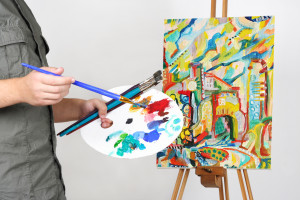 Art therapy is one tool used to support individuals in recovery. Some treatment programs offer options during treatment including individual, group, skills-focus, relapse prevention and art therapy. Expression of emotions, feelings and thoughts are encouraged as part of the healing journey throughout recovery.
Art therapy is one tool used to support individuals in recovery. Some treatment programs offer options during treatment including individual, group, skills-focus, relapse prevention and art therapy. Expression of emotions, feelings and thoughts are encouraged as part of the healing journey throughout recovery.
Types of Art Therapy
Several modalities of art therapy are used to help individuals use creativity and imagination to express thoughts and feelings. Art is a different way of communicating which sometimes helps convey difficult experiences or feelings without having to verbalize or talk about them (as in talk therapy) and increases the brain’s power to focus. The different types of art therapy normally used in recovery include:
- painting
- sculpting
- dancing
- drawing
- acting
- music
- poetry
Expression
The Substance Abuse and Mental Health Services Administration (SAMHSA) describes art therapy as a type of expressive group therapy to help people express thoughts or feelings without words. For people who have underlying psychological issues related to addiction, this form of therapy can be very beneficial and soothing. A person who has experienced a history of abuse may also find it beneficial. Creating art is nonverbal but expands the way a person conveys complex emotions. Art therapy provides an opportunity to look at issues from a different angle and explore them in a new way.
People who incorporate art therapy into recovery may experience discovery of insights and meaning about behavioral patterns and habits as well as addiction itself. Many techniques such as Gestalt method help the individual understand current feelings and experiences. Active imagination utilizes artwork as a starting point to allow an individual’s mind freedom to associate and provide introspection about personal experiences.
Incorporating Art Therapy
Recovery is a challenging, life long process. When a person is open to trying new things, opportunities emerge to discover new ways of viewing the world as well as the individual’s own perceptions, beliefs and habits. Art therapy is a safe place to express experiences, emotions and lingering issues which led to an addiction. For the person seeking an alternative to talk therapy, art has the capacity to open new doors. When searching for a treatment center, discuss the possibility of art therapy. Post treatment, develop a recovery plan which incorporates elements of art therapy and don’t be afraid to try new things. Start at the beginning and find what works. Enjoy the process of trying new avenues of exploration and see where it leads. The results may just surprise, delight and enlighten the senses and awaken new avenues of healing in recovery.
Recovery can be challenging for those who don’t know where to start. If you’re ready, Lead Recovery has trained counselors ready to talk and offer support. Contact us today at 800-380-0012.

